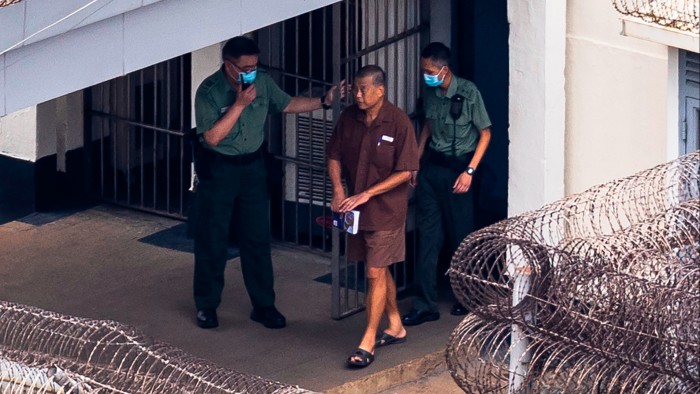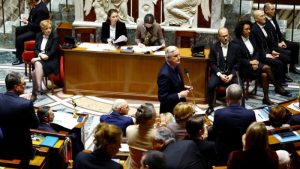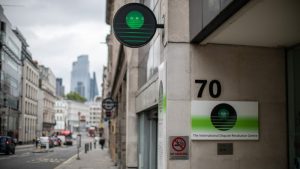Jimmy Lai case tests red lines of UK-China relations

This article is an on-site version of our Inside Politics newsletter. Subscribers can sign up here to get the newsletter delivered every weekday. If you’re not a subscriber, you can still receive the newsletter free for 30 days
Good morning. Stephen here. John Prescott, deputy prime minister of the UK from 1997 to 2007, has died at age 86. My thoughts are with his family and friends.
Georgina has very kindly written today’s note on Jimmy Lai’s trial and how it embodies the new government’s China challenge. (For more on that, do read Janan Ganesh’s column this week if you haven’t yet.)
That means I have more time to digest and think about Yvette Cooper’s ambitious plans to reform the police, which I’ll write about in tomorrow’s newsletter.
Inside Politics is edited by Iseult FitzGerald. Read the previous edition of the newsletter here. Please send gossip, thoughts and feedback to [email protected]
Pressing for change
The turning point in the campaign to free Jimmy Lai came last December — by which time the pro-democracy activist had spent three years behind bars — when David Cameron publicly acknowledged that Lai is a British citizen (ie not a dual citizen). It mattered because China doesn’t recognise this — Beijing sees him as an exclusively Chinese national with whom the UK is wrong to “interfere”.
This week came Keir Starmer’s chance to stand up for the former publisher, who defended himself in court yesterday in a national security trial that the UN Working Group on Arbitrary Detention urged shouldn’t be happening. Lai denied foreign collusion and support for Hong Kong independence, saying his Apple Daily newspaper upheld “the rule of law, freedom, the pursuit of democracy, freedom of speech, religion and assembly”. He faces a life sentence in prison. This month David Lammy met Lai’s son, Sebastien, sparking a rebuke from China’s foreign ministry. The prime minister said getting Lai out was a “priority” for the government and raised reports of his deteriorating health with Xi Jinping in Rio (right before reporters were removed from the room by Chinese officials).
Sebastien Lai says his father, a diabetic 77-year old, is increasingly unwell after nearly four years in solitary confinement in Hong Kong. (Asked about this, a Chinese embassy spokesperson said: “The trial of Lai’s case has been conducted strictly in accordance with the law, and all legal rights, including the right to defence and right to visitation, have been fully respected.”) As the trial trudges on (due to end in March, with sentencing next summer) campaigners nervously watch the clock, urging that UK discussions with China on bilateral issues are contingent on addressing Lai’s case. Mark Sabah, director of the Committee for Freedom in Hong Kong Foundation, put it to me bluntly: “What happens if he dies in jail? That’s going to be blamed firmly at the feet of Starmer and Lammy [too].”
Lai’s barrister Caoilfhionn Gallagher (of Doughty Street Chambers, the human rights specialists co-founded by Starmer) wants to meet Rachel Reeves to devise a plan before her China trip early next year, seeing potential leverage with Beijing in trade. Sebastien Lai says “any normalisation of the relationship with China needs to be conditional on my father’s immediate release and his return to the UK”.
The long road to getting UK senior officials to simply state Jimmy Lai’s citizenship underlines the economic, geopolitical complexity of the tightrope that our new government inherits. Britain had offered routes for permanent settlement for 2.9mn British National (Overseas) visa status holders in Hong Kong. Yet Starmer on Tuesday refused to publicly condemn the jail sentences of 45 pro-democracy activists — one for 10 years — in the territory. George Parker, referring to Starmer’s answer on Hong Kong at the G20, explained on X how China has only become more embedded in Britain’s goals: “There’s a recognition in No 10 that China has a key role to play in British growth not least when a) you’ve imposed European trade barriers against yourself with Brexit b) your supposed closest ally, the US, may be about to clobber you with tariffs.” Until 2005, China’s economy was smaller — but it is now five times the size of Britain’s.
Even as it boosts investment ties, the UK needs clear “red lines” on Beijing and must get ahead on these frameworks — or face messy climbdowns, such as in the case of Huawei and to some extent partnerships with China on nuclear power plant projects.
Lai’s supporters hope that the UK’s championing of human rights will prevail — and ministers take actions to match, as attacks against media freedom intensify globally. The Australian government successfully pushed for journalist Cheng Lei’s release from Chinese detention at a time when Canberra was trying to build a constructive relationship with Beijing, as Labour is now. Of course, the overarching factor here is that the UK government has responsibility for implementing the (now breached) Sino-British joint declaration on Hong Kong — that’s why six-monthly reports on the situation by the Foreign Office have been produced and set before parliament since 1997.
It’s worth noting that many of the 144,500 Hongkongers who have relocated to Britain since 2021 and have no UK party allegiance will want assurance the government is committed to their values. That won’t be easy as Labour finds itself and its policies straddling conflicting aims from the UK’s diminished place on the global stage.
Now try this
My partner got me an Ethiopian cooking class as a birthday gift this year, and ever since I have been using berbere, a spice blend, lots in my cooking — especially in lentil stews. For the professional version, Gwada café in London is delightful and does a yummy chocolate cake.
Top stories today
-
Public debt swells | The UK government borrowed more than expected in October, according to the ONS. Borrowing — the difference between public sector spending and income — was £17.4bn last month. That was £1.6bn more than in October 2023, and the second-highest October level since monthly records began in 1993.
-
Cold comfort | The Scottish government’s plan to ease contentious rent control proposals to tackle a housing emergency is sparking a tussle with opponents, who say the measures betray tenants who face spiralling housing costs.
-
Reality shock | Britain’s housing minister has warned it will be “more difficult than expected” for the government to meet its target of building 1.5mn new homes because of the depth of the current supply downturn.
-
Moscow’s response | Russia fired an intercontinental ballistic missile for the first time since it invaded Ukraine in 2022, according to Ukrainian air defence forces. It comes after Ukraine launched US-made long-range Atacms missiles and British Storm Shadows at Russian territory in recent days.
Recommended newsletters for you
White House Watch — Your essential guide to what the 2024 election means for Washington and the world. Sign up here
One Must-Read — Remarkable journalism you won’t want to miss. Sign up here
#Jimmy #Lai #case #tests #red #lines #UKChina #relations





